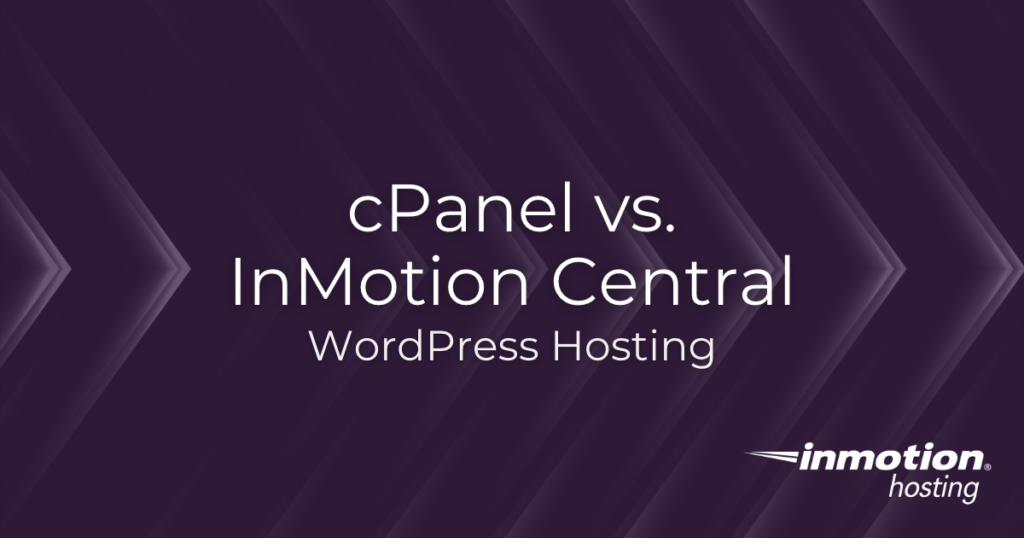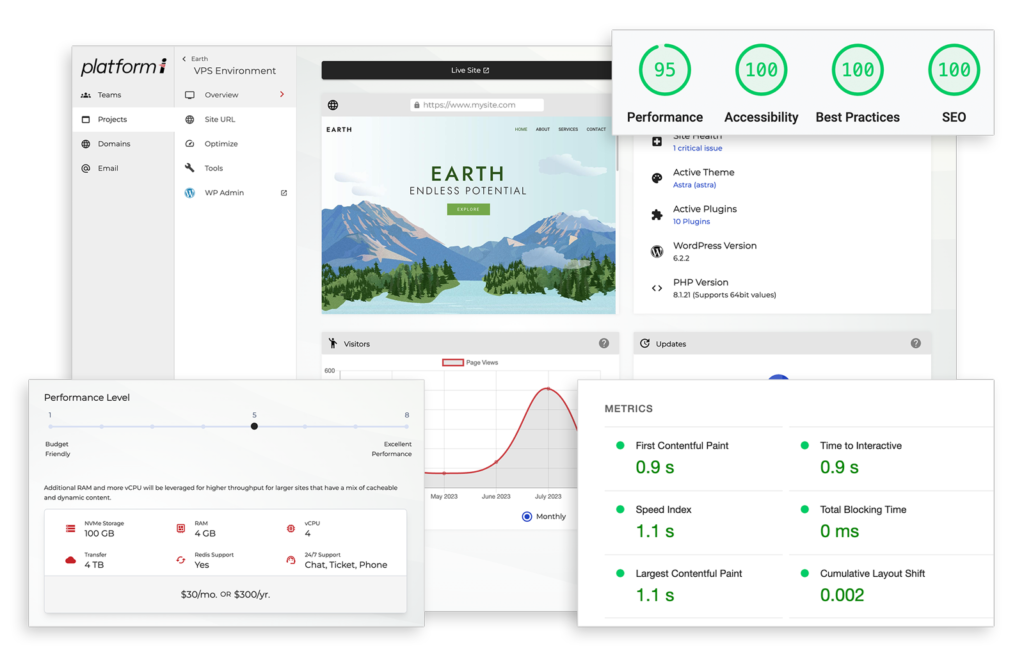[ad_1]

Control panels come in all shapes and sizes in the web hosting world, and while their tools are often similar, each has their own following for a variety of reasons.
In this article we will compare two control panels offered by InMotion Hosting for managing WordPress installations: cPanel and our latest product, Platform i for WordPress VPS hosting.
cPanel vs. Platform i Quick Comparison Guide
Both products will be broken down in further detail below, but for users mainly interested in the difference between tools, this chart provides an overview of cPanel vs. Platform i.
What are Control Panels in Web Hosting?
In simple terms, control panels are graphical user interfaces (GUIs) which help users manage their website and server configuration.
Aspects controlled by control panel include:
Domain ManagementFile ManagementDatabase AdministrationEmail SetupSecurity SettingsEtc.
Web hosting companies offer control panels to assist customers who lack technical expertise or feel uncomfortable connecting to a command terminal. These panels provide an easier way to manage various tools. Additionally, many hosting plans still provide SSH or Root access for users who prefer a more advanced approach.
What is cPanel?
While only holding about 7% of the control panel market share, cPanel is the second most used control panel in the world. cPanel offers a wide range of tools and functionalities, and has a fairly intuitive user interface which helps people new to web hosting.
Note: Although managed VPS and managed Dedicated Server customers have access to WebHost Manager (WHM) to create and manage multiple cPanel accounts on a server, this article will specifically focus on the functionalities of cPanel for WordPress website management.
With its extensive documentation and community support, cPanel has become a popular choice for web hosting providers and users alike, streamlining website management and enhancing the overall hosting experience.
cPanel Features
Because of its extensive documentation and interface, cPanel is a favorite among users. Some of its features include:
One-Click WordPress Installation: cPanel provides a seamless one-click installation process for WordPress through Softaculous or WP Toolkit, making it quick and easy to set up a WordPress website without technical knowledge.File and Database Management: cPanel’s File Manager allows users to easily manage WordPress files, including uploading, editing, and organizing them. It also provides access to PHPMyAdmin for managing WordPress databases.Email Administration: With cPanel, users can create and manage email accounts associated with their website. This includes setting up email forwarding, autoresponders, and spam filters.Security Settings: cPanel offers various security features, including SSL/TLS management, password protection, IP blocking, and firewall configuration, providing robust security measures for WordPress websites.Note: Some security settings may only be available through WHM.Backup Management: cPanel allows users to manually perform backups of their WordPress website files, databases, and configurations, ensuring data protection.Note: InMotion Hosting offers Backup Manager at a premium to allow cPanel users to create automatic backups for their website files and database. These backups are saved on a separate server, eliminating loss of data should something happen to your website’s server. General manual cPanel backups are still available for users. Website Statistics: cPanel provides detailed website statistics and analytics through AWStats, such as visitor logs, bandwidth usage, and resource statistics, giving users insights into their WordPress website’s performance and traffic.CMS Support: Apart from WordPress, cPanel supports the installation and management of other Content Management Systems (CMS), such as Drupal or Joomla, allowing users to access multiple websites in one account.
These features make cPanel a reliable and efficient tool for managing WordPress websites, offering convenience, security, and performance optimization.
What are All-in-One Dashboards?
As explained above, control panels focus on the technical aspects of hosting and provide tools specifically tailored for server and website management.
An all-in-one dashboard, on the other hand, is a broader concept that encompasses not only hosting-related tasks but also other website management functionalities.
All-in-One Dashboards typically include features like account management, SEO optimization, analytics, billing and support, and more. This type of dashboard aims to provide a comprehensive solution for managing all aspects of a website in a single interface.
What is Platform i?
Platform i is InMotion Hosting’s newest product. It is a powerful all-in-one dashboard with multiple site and account management features to create the best user experience possible on a fully-isolated VPS server.

Currently, Platform i only caters to WordPress websites. Its focus is to provide users with a highly optimized server environment for WordPress, ensuring fast performance.
Users who have a Platform i account can also invite other people to collaborate in projects at no charge via Teams. This makes it a perfect choice for agencies managing a corporate website or for designers looking to get their client’s thoughts on a current project.
Platform i is easy to use, powerful, and fast, making it a great choice for users looking for a premium managed WordPress hosting experience.
Platform i Features
As an All-in-One Dashboard with a focus on WordPress, some of Platform i’s features include:
WordPress Pre-Installed: Platform i starts you off with a server environment that has the latest version of WordPress pre-installed. However, you can easily create more WordPress installations with the click of a button on your Projects area. File and Database Management: With Platform i, you can easily access the File and Database Manager. This feature is currently available on Playgrounds only, but will be available soon for the VPS environments. You can also access these through SSH access.Note: A Premium key is required for access to the GUI version of the File and Database Management. WordPress Management: Activate, deactivate, or update Plugins and Themes, check your site health, and create backups without logging into your WordPress dashboard. Playgrounds (Exclusive to Platform i): Playgrounds allow you to safely stage, test, and redesign websites. Troubleshoot issues, fix errors, and add new features on a Playground without breaking your live site.Snaps (Exclusive to Platform i): Snaps facilitate the ability to create a WordPress site by creating theme and plugin blueprints. This feature is great for agencies that build sites using a common set of plugins, and eliminates the need to install each plugin individual. All Snap sites start off in a Playground environment, and will be available soon for deployment to the VPS production environment.Email Administration: Email management is currently facilitated through cPanel, and includes the ability to manage email inboxes and spam filters. Users can easily access their inboxes by way of the Platform i interface.Teams (Exclusive to Platform i): Invite other users to see, manage, and work together on a project with you at no additional cost. Security Settings: Each production server operates as a fully-isolated container, eliminating any possibility of cross-infection from other customers. Furthermore, Platform i plans come with a Web Application Firewall (WAF) by Modsec, and protection from brute force and DDoS attacks.Backup Management: Platform i allows you to easily create website or server backups all within your Dashboard. Use the Backups section under Maintenance to create website backups and easily restore them; or create a Server Snapshot to capture all of your server settings at a specific time, and go back to these when necessary.Website Statistics: Easily check your website statistics of your project under the Site Stats section. Get an overall view of visitors, Site Health recommendations, and view your overall WordPress settings. CMS Support: Currently, Platform i only supports WordPress websites, but this may change in the future. Account and Billing Management: Platform i lets you assign resource ownership for Project assets, view subscriptions and receipts, and customize billing information for each Team.
Platform i is an ideal solution for agencies, marketing teams, and web designers seeking a way to easily manage WordPress sites that are fast. Users can harness the power of a fully-isolated VPS with hyperfast performance, Playground environments for testing, and WordPress management tools all from a single dashboard.
Final Thoughts
In conclusion, both cPanel and Platform i offer their own unique set of features and advantages for WordPress site owners.
cPanel provides a tried-and-tested solution that has been widely used and trusted by the web hosting industry for years. It offers a comprehensive range of tools and functionalities, making it suitable for users who prefer a traditional and feature-rich control panel.
Platform i presents a streamlined and consolidated approach, bringing together multiple functionalities into a single dashboard. This option may appeal to users seeking simplicity and ease of use while taking advantage of its powerful infrastructure.
Ultimately, the decision between cPanel vs. Platform i should be based on your individual needs, preferences, and the specific requirements of your website.
Related
[ad_2]
Source link

